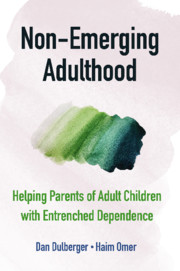Book contents
- Non-Emerging Adulthood
- Non-Emerging Adulthood
- Copyright page
- Contents
- Introduction
- 1 The Adult-Child
- 2 NVR and Accommodation
- 3 The Intervention
- 4 Suicide Threats
- 5 Helping Parents of Children and Adolescents at Risk of Failure to Emerge
- 6 Addressing Entrenched Dependence in Special Contexts
- 7 Survival Mode
- Conclusion
- Bibliography
- Index
1 - The Adult-Child
Functional and Dysfunctional Dependence
Published online by Cambridge University Press: 05 May 2021
- Non-Emerging Adulthood
- Non-Emerging Adulthood
- Copyright page
- Contents
- Introduction
- 1 The Adult-Child
- 2 NVR and Accommodation
- 3 The Intervention
- 4 Suicide Threats
- 5 Helping Parents of Children and Adolescents at Risk of Failure to Emerge
- 6 Addressing Entrenched Dependence in Special Contexts
- 7 Survival Mode
- Conclusion
- Bibliography
- Index
Summary
In Chapter 1, based on the notion of emerging adulthood, we define adult entrenched dependence as a failure to emerge. Children’s dependence on their parents can be characterized as functional or dysfunctional. We propose ways to differentiate between the two. We clarify that the goal of our approach is not fostering "independence" (which we view as a rather problematic goal) but helping transform dysfunctional into functional dependence. The main changes we try to promote are: (a) developing a time perspective that allows parents to strive for better functioning; (b) helping parents transition from personal effacement into presence; (c) releasing parents from their "sacrifice mentality" in favor of recommitment to wellness; (d) helping parents counter the adult-child's entitlement; and (e) identifying and resisting various forms of violence, blackmail and exploitation.
Keywords
- Type
- Chapter
- Information
- Non-Emerging AdulthoodHelping Parents of Adult Children with Entrenched Dependence, pp. 11 - 33Publisher: Cambridge University PressPrint publication year: 2021

